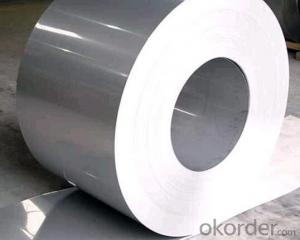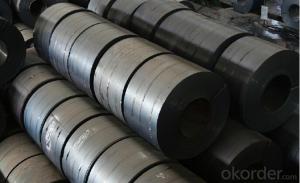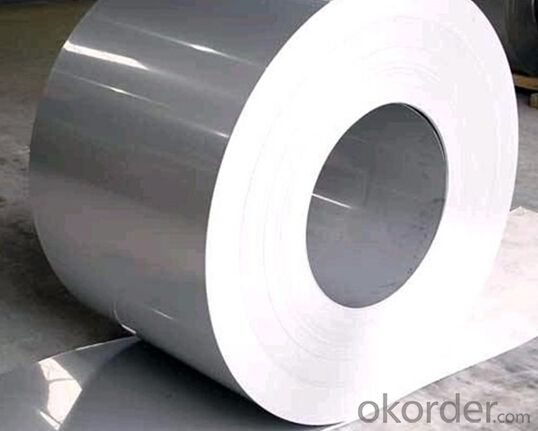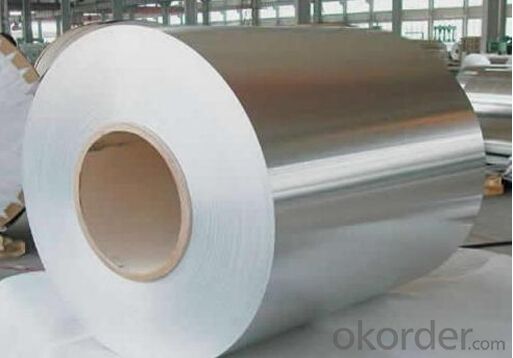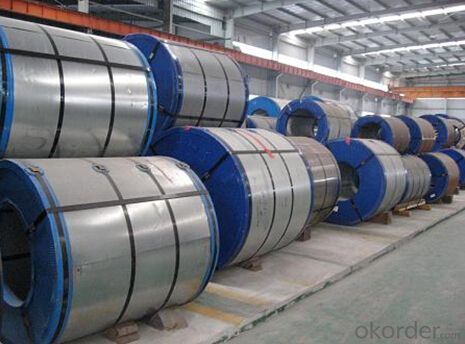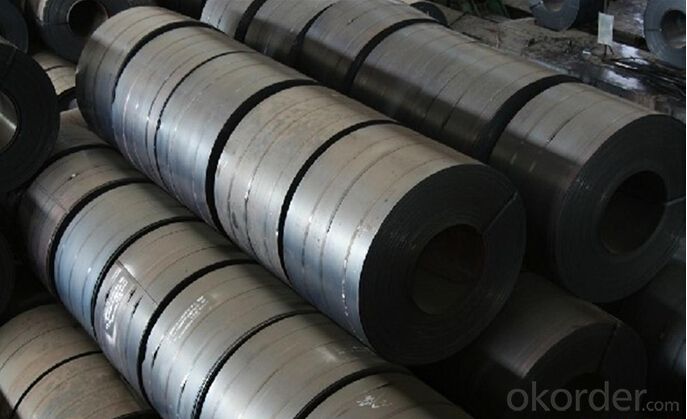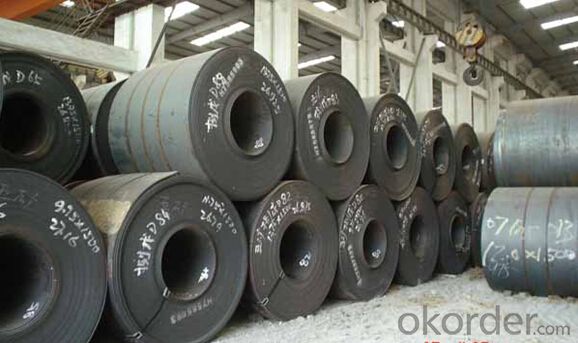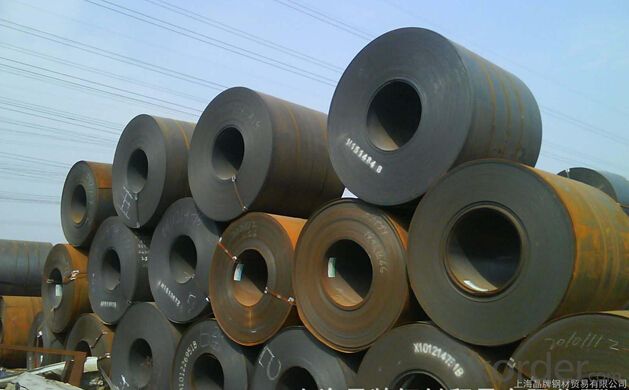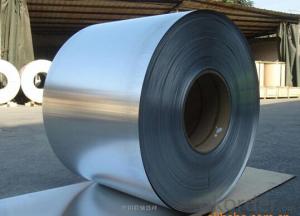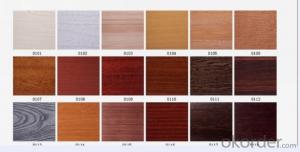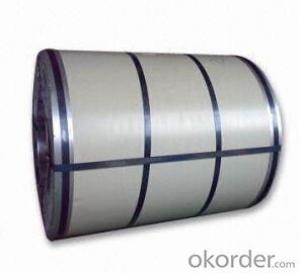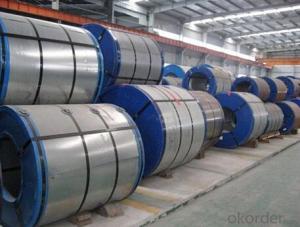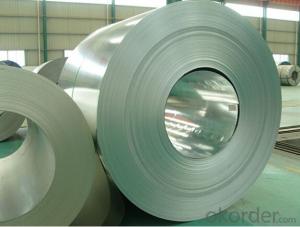Grade ASTM A653-CS-B Galvanized Steel Coil
- Loading Port:
- Tianjin
- Payment Terms:
- TT OR LC
- Min Order Qty:
- 3 m.t.
- Supply Capability:
- 10000 m.t./month
OKorder Service Pledge
OKorder Financial Service
You Might Also Like
Specification
Grade ASTM A653-CS-B Galvanized Steel Coil
Specification of Grade ASTM A653-CS-B Galvanized Steel Coil
1. Galvanized Steel Coil
(1) Width: 600-1570mm
(2) Thickness: 0.13-5.0mm
(3) Grade: JIS G3302-SGCC-SGC570, SGCH (full hard-G550), SGHC-SGH540
EN10346-DX51D+Z, DX53D+Z, S250GD-S550GD
STM A653-CS-B, SS255-SS550
(4) Zinc Coating: Z40g/m2~Z500g/m2 (both side total coating thickness)
2. Galvalume Steel Coil
(1) Width: 600~1500mm
(2) Thickness: 0.15~2.30mm
(3) Grade: JIS G3321-SGLCC, SGLC400-570, (G550)
EN10346-DX51D+AZ, DX53D+AZ, S250-S550
ASTM A792M CS-B, SS255-SS550
(4) AZ Coating: AZ50~AZ185g/m2
3. Prepainted Galvanized Steel Coil (PPGI)
(1) Width: 600~1250mm
(2) Thickness: 0.19~1.50mm
(3) Grade: JIS G3312-CGCC, CGC340-570, (G550)
ASTM A755M CS-B, SS255-SS550
(4) Zinc Coating: Z40g/m2~Z500g/m2 (both side total coating thickness)
4. Prepainted Galvanized Steel Coil (PPGL)
(1) Width: 600~1250mm
(2) Thickness: 0.20~1.50mm
(3) Grade: JIS G3322-CGLCC, CGLC340-570, (G550)
ASTM A755M CS-B, SS255-SS550
(4) AZ Coating: AZ50~AZ185g/m2 (both side total coating thickness)
5. Cold Rolled Steel Coil (Soft) (for further information, pls click the product name)
(1) Width: 600~1570mm
(2) Thickness: 0.13~2.50mm
(3) Grade: JIS G3141-SPCC-SD, SPCD-SD, SPEC-SD
JIS G3135-SPFC 340/390/440
EN10130-DC01, DC03, DC04
SAE1006, SAE1008
ASTM A424-TypeⅡ
6. Cold Rolled Steel Coil (Full Hard) (for further information, pls click the product name)
(1) Width: 600~1570mm
(2) Thickness: 0.13~2.50mm
(3) Grade: JIS G3141-SPCC-1B, SPCC-1D
7. Hot Rolled Steel Coil
(1) Width: 1000~1524mm
(2) Thickness: 1.20~16.5mm, other thickness can be negotiation
(3) Grade: JIS G3101-SS400, JIS G3132-SPHT1/2/3, ASTM A36, Q195, Q235 etc.
Company Introduction of the Grade ASTM A653-CS-B Galvanized Steel Coil
CNBM International Corporation is the most import and export platform of CNBM group(China National Building Material Group Corporation) ,which is a state-owned enterprise, ranked in 270th of Fortune Global 500 in 2015.
With its advantages, CNBM International are mainly concentrate on Cement, Glass, Iron and Steel, Ceramics industries and devotes herself for supplying high quality series of refractories as well as technical consultancies and logistics solution.
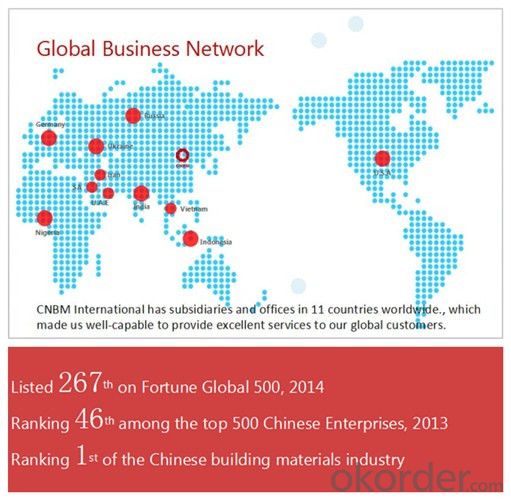
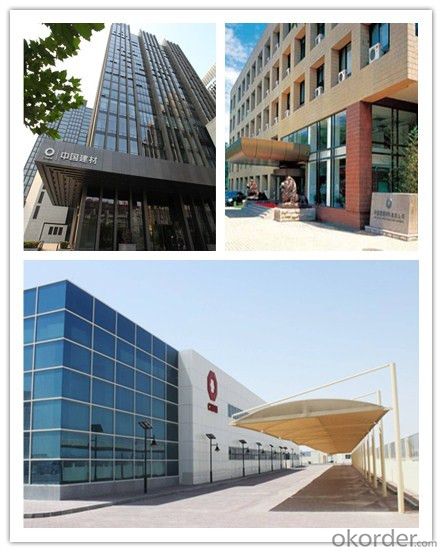
Packaging & Delivery of the Grade ASTM A653-CS-B Galvanized Steel Coil
Packaging Detail | Sea worthy packing /as per customer's packing instruction |
Delivery Detail | 15 ~ 40 days after receiving the deposit |
Products Show:
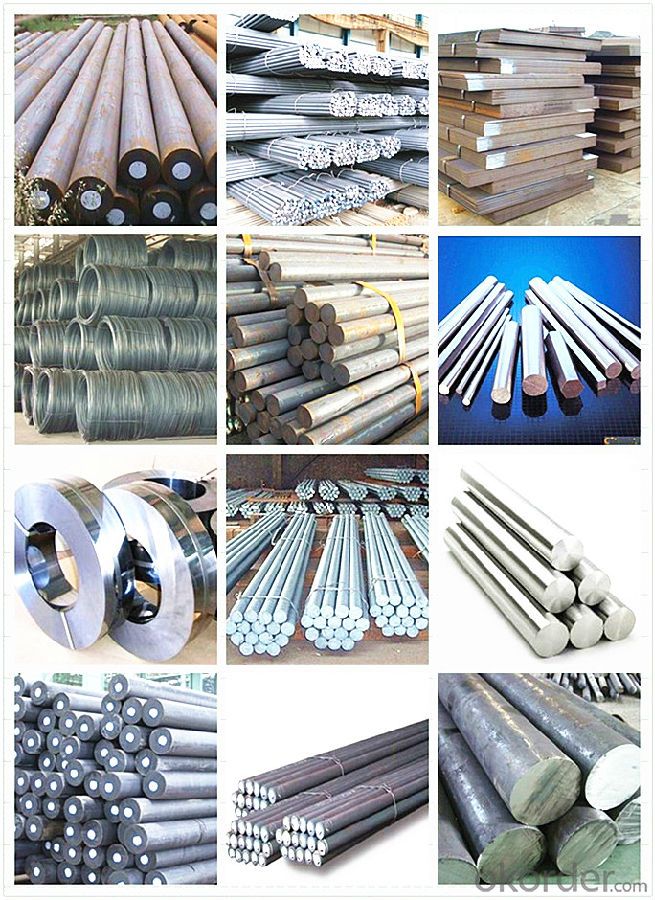
FAQ:
Are you a trading company or manufacturer? | Manufacturer |
What’s the MOQ? | 3 metric ton |
What’s your delivery time? | 15-35 days after downpayment received |
Do you Accept OEM service? | Yes |
what’s your delivery terms? | FOB/CFR/CIF |
What's the Payment Terms? | 30% as deposit,70% before shipment by T/T |
Western Union acceptable for small amount. | |
L/C acceptable for large amount. | |
Scrow ,Paybal,Alipay are also ok | |
Why choose us? | Chose happens because of quality, then price, We can give you both. Additionally, we can also offer professional products inquiry, products knowledge train (for agents), smooth goods delivery, excellent customer solution proposals. |
What's your available port of Shipment? | Main Port, China |
What’s your featured services? | Our service formula: good quality+ good price+ good service=customer's trust
|
Where are your Market? | Covering more than 160 countries in the world |
- Q: What is the life cycle of special steel products?
- The life cycle of special steel products typically involves several stages, starting with the extraction and processing of raw materials to create the steel. This is followed by the manufacturing and fabrication processes, where the steel is shaped and formed into the desired product. Once the product is ready, it is typically distributed to customers and used in various applications, such as construction, automotive, or aerospace industries. During its use, the special steel product may undergo regular maintenance, repairs, or modifications to ensure optimal performance. Finally, at the end of its life cycle, the steel product may be recycled or disposed of responsibly, contributing to a more sustainable approach in the industry.
- Q: Can special steel be used in the sporting goods manufacturing industry?
- Yes, special steel can be used in the sporting goods manufacturing industry. Special steel alloys offer superior strength, durability, and corrosion resistance, which are crucial qualities for manufacturing various sporting goods such as golf clubs, bike frames, tennis rackets, and baseball bats. These alloys can be tailored to meet specific requirements, ensuring high performance and longevity in sports equipment.
- Q: How is high-temperature tool steel used in the production of hot work tools?
- High-temperature tool steel is used in the production of hot work tools due to its excellent heat resistance and ability to maintain hardness at elevated temperatures. This type of steel can withstand extreme temperatures without losing its strength, making it ideal for applications such as forging, die-casting, and extrusion. By using high-temperature tool steel, hot work tools can efficiently and reliably perform under intense heat conditions, ensuring optimal productivity and durability in various industrial processes.
- Q: How does special steel contribute to the agricultural industry?
- Special steel contributes to the agricultural industry by providing durable and high-performance materials that enhance the efficiency and productivity of agricultural machinery and equipment. It is used in the manufacturing of components like blades, cutting tools, plows, and harrows, which need to withstand tough conditions and heavy use. Special steel's strength, corrosion resistance, and ability to retain sharp edges make it ideal for these applications, ensuring longer lifespan, improved performance, and reduced maintenance costs for agricultural machinery.
- Q: How is the tensile strength of special steel measured?
- The tensile strength of special steel is typically measured using a standardized test called a tensile test. In this test, a sample of the special steel is subjected to an increasing amount of tension until it reaches its breaking point. During the test, the applied force is measured, and the corresponding deformation or elongation of the sample is also recorded. The tensile strength is then calculated by dividing the maximum force applied to the sample by its cross-sectional area before the test. This measurement provides an indication of the maximum amount of stress the steel can withstand before it fails or breaks. The tensile strength is an important parameter in determining the suitability of special steel for various applications and ensuring the structural integrity and reliability of the material.
- Q: How does special steel contribute to reducing maintenance costs?
- Special steel contributes to reducing maintenance costs by offering superior strength, durability, and corrosion resistance compared to regular steel. Its enhanced properties make it more resistant to wear, fatigue, and damage, thereby decreasing the frequency of maintenance and replacement needs. Additionally, special steel's ability to withstand harsh operating environments and extreme temperatures ensures longer equipment lifespans, reducing the overall maintenance expenses in the long run.
- Q: What are the different methods of surface tumbling for special steel?
- There are several methods of surface tumbling that can be used for special steel. These methods include barrel tumbling, vibratory tumbling, and centrifugal tumbling. Barrel tumbling is a common method used for surface finishing of special steel. In this process, the steel parts are placed in a rotating barrel along with abrasive media. The barrel then rotates, causing the steel parts to tumble and come into contact with the abrasive media. This action helps to remove any burrs, sharp edges, or surface imperfections from the steel parts, resulting in a smoother and more polished surface finish. Vibratory tumbling is another method that can be used for surface tumbling of special steel. In this process, the steel parts are placed in a vibrating container along with abrasive media. The vibration causes the steel parts to move and come into contact with the abrasive media, effectively removing any surface imperfections. Vibratory tumbling is often preferred for delicate or complex-shaped steel parts, as it provides a gentler action compared to barrel tumbling. Centrifugal tumbling is a specialized method that utilizes centrifugal force to achieve surface tumbling of special steel. In this process, the steel parts are placed inside a rotating drum, which is then spun at a high speed. The centrifugal force causes the steel parts to move and come into contact with the abrasive media, resulting in the removal of any surface imperfections. Centrifugal tumbling is often used for smaller or more intricate steel parts, as it allows for precise control over the tumbling action. Overall, these different methods of surface tumbling provide various options for achieving the desired surface finish for special steel. The choice of method depends on factors such as the size, shape, and delicacy of the steel parts, as well as the desired level of surface finish.
- Q: How does special steel perform in high-temperature oxidation conditions?
- Special steel performs well in high-temperature oxidation conditions due to its exceptional resistance to oxidation and formation of protective oxide layers, which helps prevent corrosion and maintain its strength and integrity even at elevated temperatures.
- Q: What are the different standards and specifications for special steel?
- There are various standards and specifications that govern the production and use of special steel. These standards ensure that the steel meets specific requirements and performance criteria for various applications. Some of the most common standards and specifications for special steel include: 1. AISI/SAE standards: The American Iron and Steel Institute (AISI) and the Society of Automotive Engineers (SAE) have developed a set of standards for steel grades used in various industries. These standards classify different types of special steel based on their chemical composition and mechanical properties. 2. ASTM standards: The American Society for Testing and Materials (ASTM) provides standards for steel materials used in construction, manufacturing, and engineering applications. ASTM standards define the chemical composition, mechanical properties, and other characteristics necessary for specific grades of special steel. 3. EN standards: The European Committee for Standardization (CEN) has developed a set of standards known as the European Norm (EN) for steel products. EN standards cover a wide range of steel grades and specify the requirements for their chemical composition, mechanical properties, and testing procedures. 4. JIS standards: The Japanese Industrial Standards (JIS) specify the requirements for various types of steel used in Japan. These standards cover a wide range of steel products, including special steel, and provide guidelines for their chemical composition, mechanical properties, and other quality parameters. 5. ISO standards: The International Organization for Standardization (ISO) has established standards for steel materials used in various industries globally. ISO standards ensure the compatibility and interchangeability of steel products by specifying their dimensions, tolerances, and performance requirements. 6. MIL-SPEC standards: The United States Department of Defense (DoD) has developed military specifications (MIL-SPEC) for steel used in defense applications. These standards define the requirements for special steel used in military equipment, weapons, and vehicles, ensuring their reliability and performance under harsh conditions. 7. API standards: The American Petroleum Institute (API) provides standards for special steel used in the oil and gas industry. These standards specify the materials, dimensions, and other requirements for steel pipes, fittings, and other equipment used in oil and gas exploration, production, and transportation. These are just some of the many standards and specifications available for special steel. Manufacturers and industries must adhere to these standards to ensure the quality, performance, and safety of special steel products in various applications.
- Q: How does special steel contribute to the electrical industry?
- The electrical industry relies heavily on special steel to produce a wide range of components and equipment required for the generation, transmission, and distribution of electricity. Power transformers, for instance, heavily rely on special steel. These transformers are crucial for adjusting voltage levels in the electricity grid, allowing for efficient transmission and distribution of electricity. Special steel, thanks to its exceptional strength, durability, and magnetic properties, is employed to construct the cores of these transformers. The high magnetic permeability of special steel ensures minimal energy loss during the transformation process, resulting in more efficient power transmission. In addition, special steel is extensively used in the manufacturing of electrical conductors, such as wires and cables. These conductors are responsible for transporting electricity from power plants to various end-use applications. Special steel wires boast excellent conductivity and resistance to corrosion, making them ideal for transmitting electricity over long distances with minimal energy loss. Moreover, special steel is employed in the production of electrical connectors and terminals, ensuring secure and reliable connections between different electrical components. The electrical industry also relies on special steel for the fabrication of electrical motors and generators. The exceptional strength and magnetic properties of special steel contribute to the efficient conversion of electrical energy into mechanical energy, ensuring the smooth operation of motors and generators. Furthermore, special steel is used in the manufacturing of electrical switches, circuit breakers, and other protective devices, guaranteeing the safe and reliable functioning of electrical systems. Overall, special steel plays an indispensable role in the electrical industry by enabling the production of essential components and equipment necessary for the generation, transmission, and distribution of electricity. Its unique properties contribute to enhanced energy efficiency, reliability, and safety in electrical systems, cementing its status as an indispensable material in this industry.
Send your message to us
Grade ASTM A653-CS-B Galvanized Steel Coil
- Loading Port:
- Tianjin
- Payment Terms:
- TT OR LC
- Min Order Qty:
- 3 m.t.
- Supply Capability:
- 10000 m.t./month
OKorder Service Pledge
OKorder Financial Service
Similar products
Hot products
Hot Searches
Related keywords
